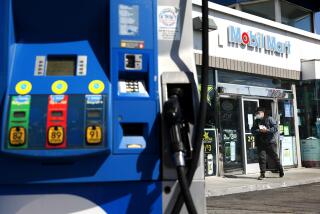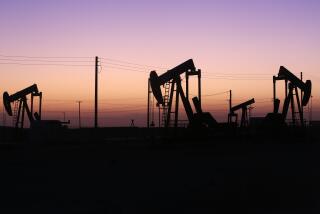Column: Fracking expert Mark Zoback: We need good science, good engineering, good regulations and good enforcement

The boom in hydraulic fracturing to extract shale oil and gas is on, and Stanford “frackologist” Mark Zoback says we already have good science. Now we need good regulation.
“Fracking” — now there’s a word that just begs for a bumper sticker. Short for “hydraulic fracturing” — the process of breaking open rock with high-pressure liquids to get at otherwise untappable oil and natural gas — fracking conjures up a welcome energy boom for some, ecological disaster for others. Mark Zoback — Stanford geophysicist since 1984, member of the National Academy of Engineering’s Deepwater Horizon investigation committee, personal “decarbonizer,” fracking expert — sees the problems and the potential for California. Zoback’s bumper sticker might read something like this: “Fracking — Do it, but do it right.”
Fracking California’s Monterey Shale, in the San Joaquin Valley, is looking like a second Gold Rush.
It’s early days. There’s probably a lot of oil that could be extracted, but operating in California is complicated by the regulatory environment, by the geology, by public acceptance, by population density in some places. California is a varied landscape. We need a regulatory system that’s adaptable to those conditions, and an industry that recognizes that while it’s perfectly safe, reasonable and straightforward to operate in some regions, it might be difficult in others.
Should regulations be federal or state?
Both state and federal regulations come to bear. The EPA governs wastewater injection wells [used after fracking to dispose of contaminated water], air quality and other aspects of oil and gas development. On federal land, the Bureau of Land Management controls drilling. But states know local conditions best and are best prepared to adapt. How could one-size-fits-all federal regulations even work for a state like California? The problem is that some states are not doing a very good job. The real challenge is to bring all the states up to high standards and do the best we can to allow development while protecting the public, the environment and so on.
Do we know enough about fracking to draw up good regulations in the first place?
Absolutely. More than 100,000 horizontal and multi-stage “fractured” wells have been drilled in the U.S. and Canada. We know exactly what to do. It’s just a matter of making sure industry follows best practices, that we have good regulations in place, and those regulations are enforced.
That’s optimistic. Legislatures pass regulations and then may not have money to enforce them, or may deliberately not appropriate money to enforce them.
These things do happen, but the oil and gas industry is a large-scale industrial process, [like] food preparation, aviation, transportation, chemical plants. We live in a highly technological and complex society, and the only way we can survive is through the marriage between technology and regulation.
You’re right, regulations are often neglected or abused, and that neglect manifests itself in dramatic accidents [like] Deepwater Horizon. I was on a committee investigating the causes. There were many causes, and not to defend the culpable individuals and companies, but it did reveal a dysfunctional regulatory system. Could a well-functioning system have stopped the accident? That’s a hypothetical. But the regulatory system we had couldn’t have stopped it, and we know it didn’t.
Is any place doing it right?
Pennsylvania has been very conscientious. They’re recycling the water so they use less and inject extremely small amounts. Texas last year improved its well-construction standards. Texas just hired a state seismologist.
[States] need a water plan. We need a plan for roads, for pipelines. We need a plan for air pollution. We have to talk about the impact on communities. Look at North Dakota: the economy is booming, the unemployment rate is low — it’s great times, but there’s also more bar fights, prostitution and strangers in town. There are so many issues at different levels.
California is considering a moratorium on fracking.
I’m usually against such moratoriums. Many people believe that everything we do to impede oil and gas development will be a step toward a decarbonized energy future. I’m very committed to a decarbonized energy future, but you have to recognize our dependence on hydrocarbons.
We need a well-thought-out energy policy that allows a transition to a decarbonized energy future, that respects the need for economic growth not only in this country but around the world. We have to double the size of the energy system [and yet] reduce its impact on the environment; we have to respect national security.
That’s very daunting, and moratoria just say this is bad, let’s stop doing it. Moratoria tend to make a political statement, but I’m not sure we need political statements. We need good science, good engineering, good regulations and good enforcement.
You’re committed to decarbonizing?
My wife and I bought our first hybrid in 2001. We’re now on our third, and I’m planning on buying an electric car next year. We just about paid off our solar panels, so we are going to be producing free electricity in another two years. We all have to walk the walk.
A single well can use on average more than 5 million gallons of water over its lifetime. Is fracking wise where water is scarce?
There are alternatives to fresh water; if you drill through the freshwater zone, you go into rocks where the water is very salty, unusable for irrigation or public consumption. Offshore wells are drilled with salt water. Where water is scarce, industry should start using saline or brackish water and not fresh water.
The other possibility is not to frack with water at all. The industry did this many years ago, and they’re reexamining [it]. [State] regulations might, as part of a permit, say you have to have a water plan and if fresh water is scarce, then that plan better have nonpotable water as a source, and maybe have water recycling.
Fracking-related earthquakes were reported in Oklahoma, and Ohio now requires seismic monitoring. Does fracking cause earthquakes?
There have been well-documented cases around the country where wastewater injection [post-fracking] has triggered slip on preexisting geologic faults that would have produced an earthquake someday anyway. You need to avoid injection into potentially active faults. Pretty straightforward, but if you don’t think about this ahead of time, you won’t do it. There have been a handful of cases, mostly in northernmost British Columbia, where hydraulic fracking itself has triggered earthquakes. It does the oil and gas industry no benefit to pressurize a preexisting fault.
We can manage this risk. I don’t want to minimize the potential for things to go wrong, but you need [to] see what’s being proposed and draw a conclusion about what’s safe and what isn’t. In our Deepwater Horizon report, we refer to an engineering [risk] principle, ALARP, “as low as reasonably possible.” The fear of fracking is being used as a scare tactic. There are environmental impacts, and our job is to do everything possible to minimize them, not just scare the public.
Who’s winning the PR war?
Right now it’s kind of a draw. For a long time, the industry was slow to recognize the degree of public concern. They do recognize it now, and the importance of engaging the public.
Some companies maintain a lot of secrecy around what they’re doing.
Sunlight is a great disinfectant. The more information, the less paranoia there is. The industry benefits very little from keeping things proprietary. I work a lot with them; I’m a consultant, but I’m not an apologist or a spokesman for the oil and gas industry.
You served on the secretary of Energy’s committee on shale gas development and environmental protection. What did you conclude?
The president asked the secretary to investigate whether these resources could be developed in a manner that protects public safety and the environment. We said without question it can. But — there’s always a but — we made 20 recommendations on how things should be done better: well construction, life-cycle of the water system, better control on local air pollution when wells are being drilled and fracked.
It’s not like we [should] put the regulations in place and suffer the consequences. Our committee pointed out the principle of continuous improvement: any industry has to continuously improve to be competitive, and we need to do that with our regulatory system as well. And when there are unintended consequences; there [should be] a process by which those can be evaluated and appropriate change instigated.
Would you live near a fracking site?
Oh sure.
This interview was edited and excerpted from a transcript. patt.morrison@latimes.com. Twitter: @pattmlatimes
More to Read
A cure for the common opinion
Get thought-provoking perspectives with our weekly newsletter.
You may occasionally receive promotional content from the Los Angeles Times.







